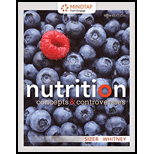
NUTRITION-MINDTAP (1 TERM)
15th Edition
ISBN: 9781337907101
Author: Sizer
Publisher: CENGAGE L
expand_more
expand_more
format_list_bulleted
Concept explainers
Textbook Question
Chapter 11, Problem 7SC
Which of the following minerals may help to regulate blood pressure?
a. phosphorus
b. iron
c. potassium
d. zinc
Expert Solution & Answer
Want to see the full answer?
Check out a sample textbook solution
Chapter 11 Solutions
NUTRITION-MINDTAP (1 TERM)
Ch. 11 - Complementary and alternative medicines (CAM)...Ch. 11 - Prob. 2RQCh. 11 - Prob. 3RQCh. 11 - Prob. 1SCCh. 11 - Prob. 2SCCh. 11 - Prob. 3SCCh. 11 - Prob. 4SCCh. 11 - Men suffer more often from heart attacks than...Ch. 11 - Smoking powerfully raises the risk for CVD in men...Ch. 11 - Which of the following minerals may help to...
Knowledge Booster
Learn more about
Need a deep-dive on the concept behind this application? Look no further. Learn more about this topic, health-nutrition and related others by exploring similar questions and additional content below.Similar questions
- ________ is mostly plasma. a. Adipose tissue c. Cartilage b. Blood d. Bonearrow_forwardAfter triglycerides are absorbed, they leave the cell and move into the ________. a. bloodstream b. intestinal cells c. liver d. lactealsarrow_forwardAbnormal hardening of bone is known as _____________________.arrow_forward
- An individual with very low levels of vitamin D presents themselves to you complaining of seemingly fragile bones. Explain how these might be connected.arrow_forwardThe hormone insulin enhances the transport of glucose (sugar) from the blood into most body cells. Its secretion is controlled by a negative-feedback system between the concentration of glucose in the blood and the insulin-secreting cells. Therefore, which of the following statements is correct? A decrease in blood glucose concentration stimulates insulin secretion, which in turn further towers blood glucose concentration. An increase in blood glucose concentration stimulates insulin secretion, which in turn lowers blood glucose concentration. A decrease in blood glucose concentration stimulates insulin secretion, which in turn increases blood glucose concentration. An increase in blood glucose concentration stimulates insulin secretion, which in turn further increases blood glucose concentration. None of the preceding is correct.arrow_forward
arrow_back_ios
arrow_forward_ios
Recommended textbooks for you
 Medical Terminology for Health Professions, Spira...Health & NutritionISBN:9781305634350Author:Ann Ehrlich, Carol L. Schroeder, Laura Ehrlich, Katrina A. SchroederPublisher:Cengage LearningBasic Clinical Lab Competencies for Respiratory C...NursingISBN:9781285244662Author:WhitePublisher:Cengage
Medical Terminology for Health Professions, Spira...Health & NutritionISBN:9781305634350Author:Ann Ehrlich, Carol L. Schroeder, Laura Ehrlich, Katrina A. SchroederPublisher:Cengage LearningBasic Clinical Lab Competencies for Respiratory C...NursingISBN:9781285244662Author:WhitePublisher:Cengage Comprehensive Medical Assisting: Administrative a...NursingISBN:9781305964792Author:Wilburta Q. Lindh, Carol D. Tamparo, Barbara M. Dahl, Julie Morris, Cindy CorreaPublisher:Cengage Learning
Comprehensive Medical Assisting: Administrative a...NursingISBN:9781305964792Author:Wilburta Q. Lindh, Carol D. Tamparo, Barbara M. Dahl, Julie Morris, Cindy CorreaPublisher:Cengage Learning




Medical Terminology for Health Professions, Spira...
Health & Nutrition
ISBN:9781305634350
Author:Ann Ehrlich, Carol L. Schroeder, Laura Ehrlich, Katrina A. Schroeder
Publisher:Cengage Learning

Basic Clinical Lab Competencies for Respiratory C...
Nursing
ISBN:9781285244662
Author:White
Publisher:Cengage

Comprehensive Medical Assisting: Administrative a...
Nursing
ISBN:9781305964792
Author:Wilburta Q. Lindh, Carol D. Tamparo, Barbara M. Dahl, Julie Morris, Cindy Correa
Publisher:Cengage Learning
TISSUE REPAIR Part 1: Repair - Regeneration; Author: ilovepathology;https://www.youtube.com/watch?v=t-5EjlS6qjk;License: Standard YouTube License, CC-BY